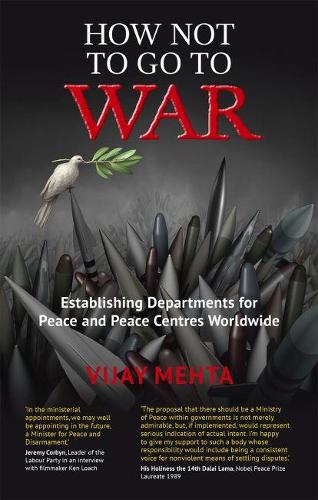
How Not to Go to War: Establishing Departments for Peace and Peace Centres Worldwide
(Paperback)
Publishing Details
How Not to Go to War: Establishing Departments for Peace and Peace Centres Worldwide
By (Author) Vijay Mehta
New Internationalist Publications Ltd
New Internationalist Publications Ltd
12th May 2020
United Kingdom
Classifications
General
Non Fiction
International relations
303.66
Physical Properties
Paperback
208
Width 138mm, Height 216mm
Description
War has been institutionalised. Giant military industries, formed from thousands of companies and employers, ensure that every old generation of war profiteers is replaced by a new one. Admirals, generals and senior defence officials demand that trillions of dollars are funnelled every year into the coffers of arms companies. People whose careers depend on the cycle of arms and warfare, insist that any break in funding is some kind of betrayal or national humiliation. Manipulated by vested interests, mainstream media justify increased military spending with spurious appeals to patriotism. In 2017, the world spent all time high $1.7 trillion on its uniformed fighters. That's equivalent to about a thousand dollars per family on the planet. Yet all these weapons have not made the world less violent. In 2015, violence cost the global economy some 14 trillion dollars, a surge of 15% from 2008. That number might seem high, until one considers the escalating inequality, famine, pollution, disease, collapse of public services, environmental damage and climate change that follows in the wake of war. Institutions endure. They can outlast the people that create them. The question asked by this book is, How can peace be institutionalised The book finds that the institutions of war need to be matched by institutions of peace. For every department of defence, there needs to be a department of peace that allocates public resources to forestall violence and militarism, by measures of pre-emptive conflict resolution rather than waiting for it to occur and then deploying violence against it. Such departments of peace will be distinct from foreign and development ministries, compromised as they are by espionage, export-promotion and securitisation of aid. By opening peace / social centres / franchises, in each city, town and village, the Peace Department can contain violence and foster a culture of peace. Fundamental to all this is the pressing need for institutionalised Peace- a network of self-sustaining peace centres and social enterprises / companies, governmental peace departments and commentators that have peace as their core mission, in the same way that arms manufacturers and defence ministries institutionalise conflict. The book shows how the establishment of Departments of Peace and Peace Centres worldwide will result in saving of trillions of US dollars which governments can utilise in jobs creation, healthcare, education and peace building. Only by institutionalising peace at many levels of society, can the peace movement become powerful enough to face-down the many commercial and official networks that have a vested interest in armed violence. A better world has less violence and war. That is what this book aims to achieve. The time for action is now. There may not be a tomorrow to wait for.
Reviews
`There has to be a change in attitude on Foreign Policy and the UKs recent history of sending troops into battle. I have spent my life opposing these to see a Foreign Policy based on democracy, human rights and based on justice. And in the ministerial appointments, we may well be appointing in the future, a Minister for Peace and Disarmament Jeremy Corbyn, Leader of the Labour Party in an interview with filmmaker Ken Loach; `The proposal that there should be a Ministry of Peace within Governments is not merely admirable, but if implemented, would represent serious indication of actual intent. Im happy to give my support to such a body whose responsibility would include being a consistent voice for non-violent means of settling disputes. His Holiness the 14th Dalai Lama, Nobel Peace Prize Laureate 1989; `Vijay Mehta proposes that in countries and communities, in governments, private institutions and media, Peace Departments and Peace Centres be established to report on and promote peace. Jose Ramos Horta, Nobel Peace Prize Winner 1996, and Former President of Timor-Leste; `I believe that the present system is coming to an end and that, with the guidance of books as How not to go to war, of Vijay Mehta, the peoples of today will be able to fulfil the immense responsibility assumed when they decided to save the succeeding generations from the scourge of war.Federico Mayor, Former Director-General, UNESCO; `Vijay Mehtas book is controversial, but it is courageously challenging. It is certainly a work for our time. It is important to read it. The stark truth it presents cannot be escaped.; Lord Frank Judd, Former Minister for Foreign and Commonwealth Office; `I welcome this contribution to the discussion on how we can secure peace in our increasingly perilous world. Ministries of Peace could play a key role into promoting conflict prevention and resolution. John McDonnell MP, Shadow Chancellor of the Exchequer
Author Bio
Vijay Mehta is an author and peace activist. He is Chair of Uniting for Peace and founding Trustee of Fortune Forum Charity. His notable books include `The Economics of Killing (Pluto Press, 2012) and `Peace Beyond Borders (Catapult/New Internationalist, 2016). The Sunday Times described him as a longstanding activist for peace, development, human rights and the environment, who along with his daughter Renu Mehta has set a precedent for striving to change the world.
